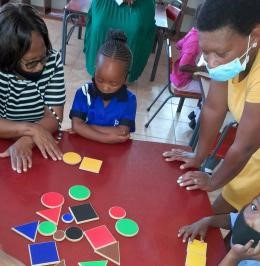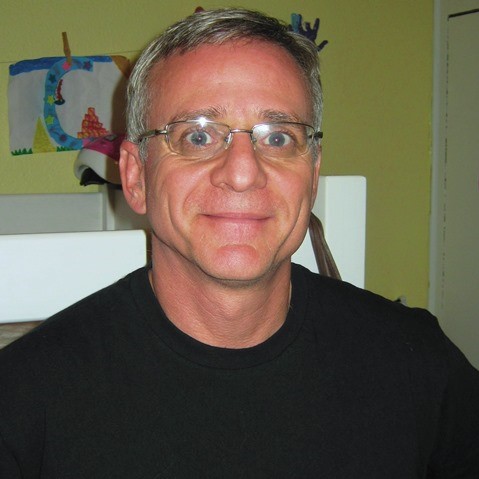Voices from the Sylff Community
Jan 27, 2023
Early Compensatory Basic Concepts Intervention Needed for All Grade R Learners
Louis Benjamin (University of the Western Cape, 2001) received a Sylff Project Grant (SPG) to disseminate the Basic Concepts Program in Northern Cape Province, one of the poorest regions of South Africa. The program he developed is designed as a cognitive intervention for preschool children to enhance their preparedness for early school education and beyond. Despite the challenges posed by COVID-19, the SPG program, implemented from 2019 to 2022, has succeeded in promoting learning and thinking in young children. The following article is reprinted from the website of Basic Concept Unlimited, an NGO led by Benjamin to promote the Basic Concepts Program in South Africa.
* * *
The Basic Concepts Programme (BCP) is considered the first compensatory cognitive intervention programme for young learners (5-9yr olds) that has been implemented extensively in South Africa. The BCP is currently being scaled throughout the Northern Cape and has been implemented extensively in the Western Cape as well. It is our contention that a compensatory cognitive intervention programme like the BCP needs to be implemented on a national scale in South Africa.
But why should there be a need for such an intervention programme in the first place? Should we not rely on the national curriculum (CAPS) or other validated and established general education programmes to address the educational needs of young learners?
We incorrectly assume that merely attending a pre-school or school would adequately address the educational needs of most children. However, through our research at the Basic Concepts Foundation over the past 18 years, we have consistently found that 70% of school starters are not school prepared. In addition, researchers have found that 78% of Grade 4 children in South Africa were not able to read for meaning. Why is school attendance not a good predictor of learning? It might be a good start but it certainly is no guarantee that children will learn. What then would guarantee that all children learn?

We incorrectly assume that children would automatically ‘hook into’ the curriculum as if the curriculum would mould itself towards the needs of every child. The curriculum provides only the content to be taught to all children and does not concern itself with pedagogy. Many children have never even experienced the inside of a classroom or encountered a formal instructional situation, yet inside the classroom we expect them to respond in vastly different and ‘schooled’ ways that emphasize logic and scientific reason over trial and error guessing. Thus lack of exposure to this school reasoning is an important cause of failing to learn.
And so starts the tragic mismatch between the teacher, curriculum, and learner. These are the critical aspects that define the dynamics of learning and often they never align. We know that learners who are not engaged in learning find it difficult to thrive at school, and yet faulty assumptions about the automaticity of learning abound. Teachers are required to follow the curriculum, and often very rigidly, as this forms a central part of how they are monitored and evaluated. Yet, there is a need for a developmental and humanistic approach to connect learners to the curriculum content through a caring adult inside the classroom.
Another aspect is that learners often start school with enormous foundational deficiencies which if not addressed in the curriculum, might be exacerbated and even stymie learning. The problem is that merely trying to plaster the gaps with content does not help, particularly if that content is not presented at the right time in the right way. Furthermore, some concepts are developmentally more important than others. Through our work at the Basic Concepts Foundation, we have become increasingly aware of the importance of establishing the fundamental conceptual systems of colour, shape, size, position, number, and letter to support future learning.
Teaching the core conceptual content, however, is a delicate process that requires an enormous amount of sensitivity from the teacher. One might compare the level of knowledge and skill needed to delicately guide the child to that of a gardener who needs to know exactly how much sun or water to give to his/her plants for them to thrive. The BCP attunes teachers to this complex human process by providing them with the tools (methods and approaches) to get a better understanding of the learning needs of their children so that they can thrive.
Finally, we find that children who become positively connected to their teachers will also start to trust them. Such children find that being schooled (which includes learning how to reason, think, develop ideas and communicate) helps them to make sense of the world and in fact, enlarges their world as they start to develop the confidence to expand their actions and thinking. Children who are self-initiating and become more self-regulating are driven to learn for the sake of learning. The opposite is true for dependent and passive children who wait for their teachers to teach them the curriculum and who will most likely not flourish or thrive.
Thus we have uncovered some surprising truths about learning:
- Going to school does not equate to learning.
- School reasoning differs significantly from everyday reasoning.
- Learning involves much more than a curriculum.
- Learning is based on the primacy of ideas, basic concepts and language.
- Teaching is more than science; it is part art, compassion, and interaction.
- Confident and self-assured children are better suited to learning.
The Basic Concepts Programme (BCP) incorporates all 6 of these areas. We cannot assume that all children are hard-wired for school learning; nor are all educational settings prepared for the challenges that we find in the South African context. We should also not expect the education system (schools, curriculums, or teachers) to automatically accommodate the complexity of difficulties that children experience. We, therefore, propose that programmes like the BCP be extended across the country into more pre-schools and primary schools alongside the curriculum, not only to jump-start learning but to enrich teaching and learning, helping children to thrive and learn. We need to be sure that the intervention programmes used to produce change are based on valid theoretical models of learning and cognitive development. The BCP has been particularly thorough in establishing its scientific validity through an extensive doctoral study and action-based fieldwork over the past 18 years. It is urgent that we start to address the actual reasons that so many of our children continue to fail to learn through the universal introduction of an early years cognitive intervention programme that has been shown to promote learning, thinking and language in young children.
Reprinted from the website of Basic Concepts Unlimited.
